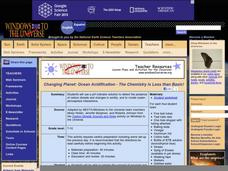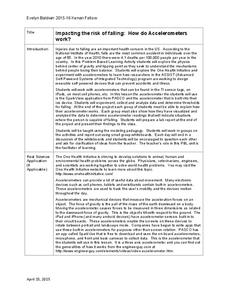Curated OER
What's the Difference Between Procedural and Substantive Due Process?
High schoolers discuss the difference between substantive and procedural due process. They research the uses of due process on the internet and books. They also discuss cases involving students and due process.
Curated OER
What is Due Process Anyway?
Students examine the term due process and its historical origins. They compare and constrast the requirements of due process in the United States Constitution and the Indiana Constitution. They also discuss the difference between...
EngageNY
Differences Due to Random Assignment Alone
It takes a lot of planning to achieve a random result! Learners compare results of random assignment, and conclude that random assignment allows results to be attributed to chance. They also realize the set of random means are clustered...
Curated OER
Energy for Earth: The Sun
Super science learners examine the sun's production of energy by the process of nuclear fusion. Hands-on activities make this lesson engaging for middle schoolers. The lesson is made up of four parts. Part I is an introduction to the sun...
Curated OER
Real-World Projects: Challenges from the Polymer Industry
Two scenarios are presented for chemistry detectives to decipher. Both require the use of an infrared spectrometer and focus on the examination of polymer materials. In the first, lumps in polyethylene bottles are analyzed. In the...
Curated OER
Traveling Through Literature
Integrate geography with literature in this interdisciplinary lesson. Begin by reading a poem such as The Time We Climbed Snake Mountain by Leslie Marmon Silko. On a large map, place push pins in the cities or states mentioned. An...
Curated OER
Sustainable Livestock
Young scholars investigate healthy eating habits by researching livestock. In this food sustainability instructional activity, students research the negative impact factory farming has on our environment due to pollution. Young scholars...
NOAA
Stressed Out!
Are our oceans really suffering due to the choices humans make? The sixth and final installment in the volume of activities challenges research groups to tackle one of six major topics that impact ocean health. After getting to the...
Agile Mind
Isabella’s Credit Card
An in-depth activity that involves a real-world problem about credit card debt. Learners are given a scenario in which Isabella plans to stop using her credit card and pay off the balance by paying a fixed amount each month. The first...
Curated OER
Light and Starch Production in Photosynthesis
Young scholars are given the unique opportunity to see the contrast between parts of a leaf that have photosynthesized and parts of the leaf that have not. This visual image helps students see the results of this biological process. At...
Curated OER
Pollution or Prevention?
Students examine potential contamination on the environment due to products and by-products of a new industrial process. Students conduct a lab that explores the economic differences between choices of pollution cleanup and prevention.
Annenberg Foundation
Evaluating Evidence
Was the Civil War fought only due to slavery? Using an interactive web tool, scholars investigate the four main causes of the Civil War. Gathering evidence and data to support their claims, they present a final statistical breakdown...
Curated OER
Gravimetric Determination of the Nonvolatile Content of Paint
Here are the instructions for leading your advanced chemists though the process of measuring the nonvolatile components in a sample of paint. No student handout is provided, so you may want to create one based on the procedure explained....
Curated OER
Changing Planet: Ocean Acidification - the Chemistry is Less than Basic!
A video and laboratory investigation are highlights to this lesson on acidification of ocean water due to increased atmospheric carbon dioxide. Using bromothymol blue (BTB) as an indicator, pupils analyze the amount of carbon dioxide...
NOAA
Off Base
How does carbon dioxide affect the world's oceans? The final installment in a series of six lessons has pupils research ocean acidification, then conduct an experiment to witness the delicate balance that exists in our seas. Materials...
Kenan Fellows
Impacting the Risk of Falling: How Do Accelerometers Work?
Young engineers consider how to apply accelerometers and sensors to help prevent falls in elderly people. They consider forces of motion and gravity as part of the engineering design process.
Serendip
Homeostasis, Negative Feedback, and Positive Feedback
So many bodily activities depend on homeostasis! Give learners a solid background to understand the basic process of the human body. Scholars first examine negative feedback loops contributing to body temperature regulation and then a...
Curated OER
Testing the Water
Students develop and test a hypotheses through collecting and recording water quality data. They perform their tests outdoors in a location with a safe stream and easy access for students. Their various experiments involve the entire...
Curated OER
Fueling Extreme Weather
First graders identify the different stages in the hydrologic cycle. To study earth science, they investigate how sunlight affects the earth's temperature. They also discuss how the sun's energy is transformed.
National Park Service
Glaciers and Water
Explore the amazing power of glaciers with a hands-on earth science experiment! After first learning basic background information, learners go on to create their very own chunks of frozen water and gravel in order to observe first-hand...
Curated OER
Diffusion through Membranes
Students identify diffusion and its processes through experimentation and calculations. They also use a CBL and conductivity probe to measure the conductivity of various solutions and study the effect of concentration gradients on the...
Curated OER
PAY CREDIT WHEN CREDIT IS DUE
Students learn about credit cards and scores and how to and not to use them. In this financial concept lesson, students are given hypothetical scenarios where they are able to apply learning's to given situations as they figure rates,...
Curated OER
The Power of Atmospheric Pressure Process
Students are introduced to the basic principles of atmospheric pressure. After watching demonstrations, they discover the capability of air pressure and how it affects weather. In groups, they use an inquiry template to solve different...
NASA
Einstein's Gravity
Assist your high school class with researching and applying the principles of gravity so they may further understand why Einstein is so widely recognized, even today. Individuals compare and contrast two different models that demonstrate...
Other popular searches
- Due Process Clause to Students
- Due Process of Law
- Due Process 14th Amendment
- Due Process Clause
- Civil Liberties Due Process
- Due Process Court Case
- Due Process Model
- What Is Due Process
- Due Process in Schools
- Government Due Process
- Substantive Due Process
- Due Process and Medicine

























